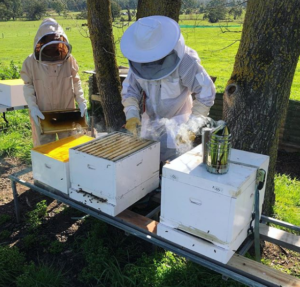
Have you heard of WWOOF? No, it’s not a dog with a stutter, it’s a program designed to connect organic farms with people happy to provide volunteer labour in exchange for board, education and cultural exchange.
What is WWOOF?
Some people keen on sustainability may seek a different working experience than on traditional farms, and WWOOFing might be the answer they are looking for.
The movement known as WWOOF started in the UK in the early 1970s where city people were invited to voluntarily work on a farm on the weekends to experience farm life, and in particular organic farming.
Although originally known as Weekend Workers on Organic Farms, interest was so high the idea was quickly broadened to include work during the week as well, so the movement was renamed Willing Workers on Organic Farms.
From the UK to Australia
Interest in the idea became international as the model quickly spread to other countries including Australia. The concept that the exchange of labour for board and lodgings could contribute to positive cultural exchanges as well led to the birth of the current name of World Wide Opportunities on Organic Farms.
Importantly, with the various iterations of the name the acronym of WWOOF and the focus on organic has remained.
How does it work?
Volunteering remains the bedrock of the program and no money changes hands for the time anyone is at the farm.
Although arrangements are fairly flexible, it expected that a worker provides 4-6 hours of their labour per day and is provided with accommodation and three meals a day in return. In addition the farm provides education and hands-on training in organic farming techniques, and is actively involved in the cultural exchange when international workers are involved. Generally it is expected that the workers become part of the household or the small working community during their stay, and accommodation may be in the family home or just on the property nearby.
Support from WWOOF
Lynette Vint is the Support Administrator of WWOOF Australia and stresses that backing for both WWOOFers and host farms is available at all times. “Trust and transparency are important features of WWOOFing in Australia and we make sure we are always there when members want help. We encourage everyone to contact us if they have any concerns and we have a great complaints procedure in place which we take very seriously. “
How the organisation is structured varies amongst the many countries that have WWOOF connections, some have a formal organisation while others less so.
In Australia both workers and host farms pay a membership fee which allows them access to each other’s profiles and provides a members-only communication channel. Ms Vint explains, “We encourage all WWOOFers to pick up the phone and email hosts prior to arrival to ensure both parties agree and understand what a typical day/week will look like. There is nothing better than a planned WWOOF experience”.
The principle of organics
What is consistent across the world is the focus on organic or sustainable methods of farming. The descriptions of biodynamic, permaculture, restorative farming and land stewardship are all terms that encompass the broad idea that WWOOFing promotes.
Like all industries organic farming practices evolve over time. With influences like market demand, prices or new types of produce, not to mention drought, floods and fires, some WWOOF farmers and producers have changed the products they once generated. This has resulted in an expansion in the variety from well over one thousand hosts that WWOOF members can choose from.
In addition to horticulture Ms Vint lists other host members – “We have livestock and dairy farms, oyster producers, flower growers, vineyards and many others. We also have producers of eucalyptus oil, cheese, honey and essential oils amongst our members”.
Farms vary in size from small hobby farms to full commercial enterprises, so long as the concept of organics and sustainability are the key essence of the operation.
COVID-19 and backpackers
Although volunteer work does not qualify towards second or third Working Holidaymaker visas, backpackers have traditionally been prominent amongst WWOOFers. Many have eagerly embraced the cultural exchange expected and have enjoyed the positive attitude of all stakeholders.
Since COVID-19 has impacted so heavily on the presence of these international travellers in Australia their disappearance has had a significant effect on WWOOFing. However it has been noticed that recently more Australians seeking a tree-change have engaged with the WWOOF concept. Some have lost their jobs due to the impact of the pandemic, while others have taken a break from the urban environment and sought regional alternatives.
And it’s not just young starry-eyed idealists either, many mature age members are contributing and learning the principles of organic and sustainable farming. Some are doing so just out of interest and support for the principles, but many are keen to put the lessons learned into practice in their own home yards and community gardens.
Know your working rights
If a farm offers a similar arrangement but is not a WWOOF member, be very aware that the protections and support offered by the organisation will not be available to you. For any worker considering an offer of farm work, ensure you know the full arrangements up front, make sure others know where you are, and understand your rights to full wages when they apply. The Fair Work Ombudsman can help with information on work rights.
So if the experience is more important than earning wages, and organics and sustainable farming practices pique your interest, WWOOFing is an alternative experience that you might consider. Check out their website for more information.
